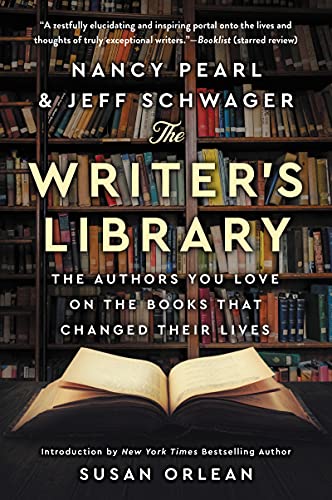Nancy Pearl & Jeff Schwager
Harper Collins Publishers

|
How-to (write) manuals are preposterous. You learn to write by reading deeply…to read (a favorite book) over and over, and see how it’s put together and what it means. It’s like a movie that you love. You’re blown away by it. There it is—the music, the sound, the color. But then when you see it the second time, then you see this camera angle or this shot or how this is done—then you see a larger way into it. And I think that’s how you learn to write. By doing that with texts. T. C. Boyle from The Writer’s Library |
Writers on books and reading
Imagine being able to sit down with a favorite author and chatting with her about her favorite authors, about the books she loves, and those that inspired her to write. That’s what Nancy Pearl and Jeff Schwager did. The result is a collection of interviews with 22 contemporary writers including Louise Erdrich (Love Medicine), Michael Chabon (The Amazing Adventures of Kavalier and Clay), T.C. Boyle (Drop City,) Amor Towles (A Gentleman in Moscow), Viet Thanh Nguyen (The Sympathizer), and Donna Tartt (The Goldfinch).
Unsurprising, most have been active readers since childhood. We learn how and why they began reading. “I read all the time,” says Luis Alberto Urrea (The Devil’s Highway) “I was always finding some other world, because the one I was in, I couldn’t deal with.” Son of an Anglo-American mother from New York and a Mexican father from Sinaloa, Urrea grew up in Tijuana, then in a “scary, ethnically volatile barrio in southeast San Diego.” “I was in this odd position of being, you know, an Irish-looking white boy who spoke Spanish. And nobody quite knew what to make of me, so they figured, ‘Let’s just beat him up.’” (Urrea also admits he read and re-read The Adventures of Tom Sawyer because “I was hot for Becky Thatcher.”)
Many recount how reading opened them to new and vaster worlds. Dave Eggers (A Heartbreaking Work of Staggering Genius) recalls the feeling of finding a book that “rips your head off.” For him, it was as a teenager first reading Dune: “I remember wandering the hallways of my high school, feeling completely apart. It felt that I’d doubled my life, as if I’d lived another full existence.”
The interviews reflect the authors’ individual, even quirky personalities, and strike an informal, often humorous tone (Asked who among contemporary writers he thinks is underappreciated, T.C. Boyle quickly exclaims, “Me!”)
They can be given to extreme opinions. Boyle maintains that Lucky Jim (by Kingsley Amis) is “the funniest book in the history of bookdom,” while Jennifer Egan (A Visit from the Goon Squad) claims that “Middlemarch may be the best novel written in English.” (!!!)
We find that they read for the same reasons most of us do. “I want to laugh, I want to cry, and I want to learn something when I read a book,” says Charles Johnson (Middle Passage.) For the poet Jane Hirschfield, books are “the reminder that somebody has thought this, spoken this, lived this before.”
The end of each interview includes a list of books which that author recommends. As Michael Chabon sums up, “Life is too short for bad books.”
This review first appeared in The Columbia River Reader (February 15, 2022.) Reprinted with permission.



